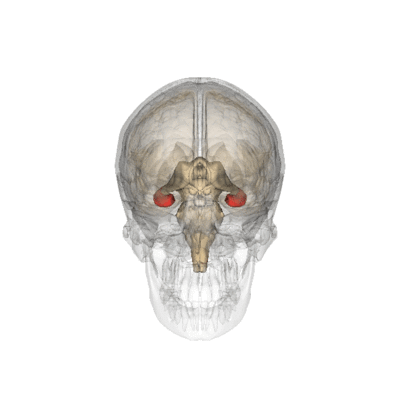Hippocampus
Original Editor - Lucinda hampton
Top Contributors - Lucinda hampton and Kim Jackson
Introduction[edit | edit source]
The hippocampus is part of the mammalian brain, and belongs to the limbic system. Humans and other mammals have two, one in each side of the brain. The hippocampus is under the cerebral cortex. It is important in spatial memory and navigation, and helps turn short-term memory into long-term memory[1].
The hippocampus is the "flash drive" of the human brain but it is far more complex in structure and function than a flash drive.
It's one of the phylogenetically oldest parts of the brain, and the first part chosen to be artificially replicated as a brain prosthesis[2].
Function[edit | edit source]
The hippocampus is known to be associated with the consolidation of episodic memories, which are memories of personally experienced events and their associated emotions. In contrast to semantic memories of abstract facts and their associations, episodic memories can be represented as stories. The hippocampus is also where short-term memories are turned into long-term memories (these are then stored elsewhere in the brain)[3].
- Declarative memories are those related to facts and events. Eg learning how to memorize speeches or lines in a play.
- Spatial relationship memories involve pathways or routes. Eg when a cab driver learns a route through a city, they use spatial memory. Spatial relationship memories appear to be stored in the right hippocampus.
Research has shown that nerve cells continue to develop throughout adulthood. The hippocampus is one of the few places in the brain new nerve cells are generated.
Damage to the hippocampus results in an inability to form new long-term episodic memories, though new procedural memories, such as motor sequences for everyday tasks, may still be learned[2]
[edit | edit source]
The hippocampus is also thought to be important to spatial navigation and orientation. It has been hypothesized that neurons in the hippocampus encode information about our environment in such a way that they create a cognitive map of our surroundings.
- The 2014 Nobel Prize in medicine recognises work on “cells that constitute a positioning system in the brain.” Those cells, called Place Cells, are found in the hippocampus. These cells help determine spatial location and allow navigation from one place to another. They contain information about direction and distance.
- Place cells allow an animal to construct a map of the environment and its location within it. The hippocampus thus allows an animal to make decisions on the basis of distance and direction towards desired goals, such as food, or away from undesirable objects, such as a predator.
- Brain scans have shown that London taxi drivers have an enlarged hippocampus compared to non-taxi driver colleagues, thanks to the spatial abilities necessary to do their job[4].
Disease[edit | edit source]
The hippocampus is a sensitive part of the brain. A range of conditions can adversely affect it, including long-term exposure to high levels of stress. See links to conditions for physiotherapy treatment:
- The hippocampus is one of the first areas to be affected by Alzheimer’s disease. An early sign of Alzheimer’s is when a person begins to lose their short-term memory. Patients cannot recognise their surroundings and lose the ability to navigate from one place to another.[4]
- As the disease progresses, the hippocampus loses volume, and it becomes harder to function in daily life.
- Autopsies have suggested that between 50 and 75 percent of people with epilepsy have damage to the hippocampus.
- However, it is not clear whether epilepsy is the cause or the result of this damage.
Depression and stress
- In people with severe depression, the hippocampus loses volume.
- Scientists are unsure whether the small size is the result of depression or if it is a contributing factor. There is evidence that stress has a negative impact on the hippocampus[3].
Physiotherapy/Exercise[edit | edit source]
The hippocampus shrinks in late adulthood, leading to impaired memory and increased risk for dementia. Hippocampal and medial temporal lobe volumes are larger in higher-fit adults, and physical activity training increases hippocampal perfusion. 2011 studies indicate that aerobic exercise training is effective at reversing hippocampal volume loss in late adulthood, which is accompanied by improved memory function[5].
References[edit | edit source]
- ↑ Kiddle Hippocampus Available from:https://kids.kiddle.co/Hippocampus (accessed 29.12.2020)
- ↑ 2.0 2.1 Wise geek hippocampus Available from:https://www.wisegeek.com/what-is-the-hippocampus.htm (accessed 29.12.2020)
- ↑ 3.0 3.1 Medical News Today Hippocampus Available from: https://www.medicalnewstoday.com/articles/313295#what_does_the_hippocamus_do(accessed 29.12.2020)
- ↑ 4.0 4.1 The Conversation Explainer: what happens in the hippocampus? Available from:https://theconversation.com/explainer-what-happens-in-the-hippocampus-32589 (accessed 29.12.2020)
- ↑ Erickson KI, Voss MW, Prakash RS, Basak C, Szabo A, Chaddock L, Kim JS, Heo S, Alves H, White SM, Wojcicki TR. Exercise training increases size of hippocampus and improves memory. Proceedings of the National Academy of Sciences. 2011 Feb 15;108(7):3017-22. Available from:https://www.pnas.org/content/108/7/3017(accessed 29.12.2020)










